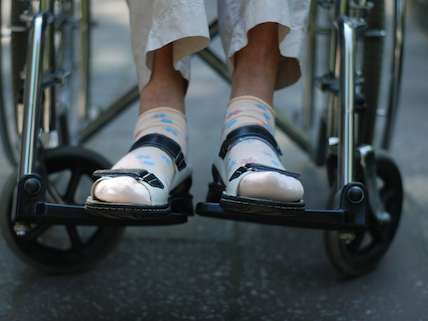Dying, Wheelchair-Bound Sex Offender Must Leave Hospice Care Because There's a Preschool Nearby
But please, think of the children.


In Florida, a wheelchair-bound man with end-stage Alzheimer's must move out of the hospice where he's dying, because he is a registered sex offender and the hospice is too close to a preschool.
Phew! That will certainly make the kids a lot safer.
Not that he was ever a threat to kids anyway. The dying man, Jack Ehrhart, was convicted of a sex offense about 30 years ago, when he was a doctor. Several patients accused him of touching them sexually during their gynecological exams—with a nurse present. He now faces arrest unless he gets himself out of the Heartland Hospice. As Izzy Kapnick reports in the Courthouse News Service:
The City of Boynton Beach purportedly issued a notice to Ehrhart and the hospice accusing them of violating an ordinance that prohibits sex offenders from living within 2,500 feet of a school, daycare center or playground.
"Heartland claims to be incurring fines imposed by the city due to plaintiff's status and has threatened to have Boynton Beach Police arrest [him] for a violation of the ordinance," according to the emergency petition, filed by Ehrhart's wife under a power of attorney.
Ehrhart's wife is arguing that the residency restrictions apply only to people who have deliberately chosen to live where they live. But her husband's condition means he not only had no say in where he's living, he has no idea where he is now.
Still, Heartland is trying to ship him out, but having a hard time, because it can't find other hospices that will take him.
Meanwhile, Ehrhart's attorney is trying to get him off the sex offender registry, arguing that Florida allows some former offenders to be removed from the list after being on it 25 years.
If the court does not grant an emergency injunction, according to CNS "Ehrhart is in imminent danger of being arrested and placed in a detention center with inadequate hospice care."
This is how we treat people on the sex offender registry. They are considered a horrible threat to children even when drooling in a wheelchair. If Ehrhart had been convicted of manslaughter, or heroin manufacturing, or massive fraud and had served his time, he would not be on a registry 30 years later. He would be allowed to die in peace.
Now all that stands between him and a jail cell is a hearing, as soon as possible. But as Kapnick reports, the court has ruled that "this matter is not [an] emergency and shall be heard in the ordinary course."
It's an emergency for Ehrhart, but the court doesn't seem to view him as a human being.


Show Comments (46)